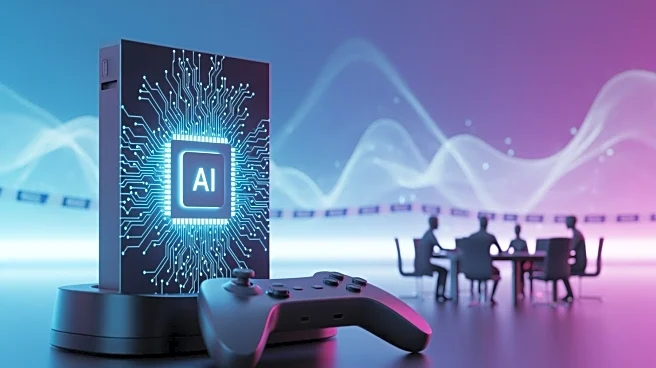What's Happening?
Prominent figures in the video game industry, Hideo Kojima and Glen Schofield, have expressed support for the integration of artificial intelligence (AI) in game development. Kojima, known for his creative
work, views AI as a tool to boost efficiency while maintaining creative leadership. He envisions AI handling tedious tasks to reduce costs and save time, fostering a collaborative environment between humans and AI. Schofield, co-creator of Dead Space, has been experimenting with generative AI for two years, believing it can address industry challenges by improving speed and efficiency. Despite concerns about job losses, Schofield argues that technological advancements historically create more jobs, citing past innovations like Photoshop and motion-capture technologies. Both developers emphasize AI's role as a supportive tool rather than a replacement for human creativity.
Why It's Important?
The endorsement of AI by industry veterans highlights its potential to transform game development processes. By automating repetitive tasks, AI can allow developers to focus on creative aspects, potentially leading to higher quality games and faster production times. This shift could benefit companies by reducing costs and increasing competitiveness in a rapidly evolving market. However, the integration of AI also raises concerns about job displacement, as seen with recent layoffs in the industry. The balance between technological advancement and employment stability remains a critical issue. The broader acceptance of AI could drive innovation, creating new roles and opportunities within the industry, while reshaping traditional job functions.
What's Next?
As AI continues to gain traction in game development, companies may increasingly invest in AI technologies to enhance their production capabilities. This could lead to further exploration of AI's potential in other creative industries, setting a precedent for its use in various sectors. Developers and companies will need to navigate the ethical implications of AI integration, ensuring transparency and fairness in its application. The industry may witness a shift towards collaborative AI-human workflows, requiring new skill sets and training programs to equip workers for evolving roles. Stakeholders will likely monitor the impact of AI on employment and industry dynamics, adapting strategies to mitigate potential disruptions.
Beyond the Headlines
The integration of AI in game development could spark broader discussions about the ethical use of technology in creative fields. As AI tools become more sophisticated, questions about authorship, intellectual property, and the role of human creativity may arise. The industry may need to establish guidelines to address these concerns, ensuring that AI complements rather than overshadows human contributions. Additionally, the potential for AI to democratize game development by lowering barriers to entry could lead to increased diversity and innovation, reshaping the landscape of the industry.









